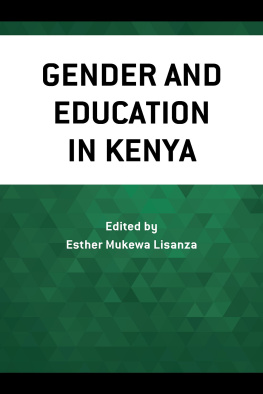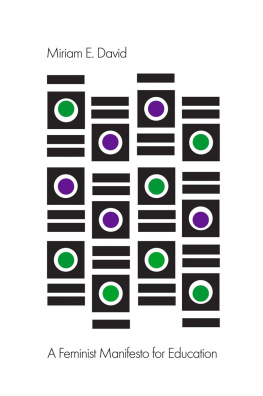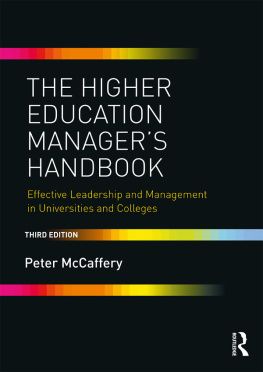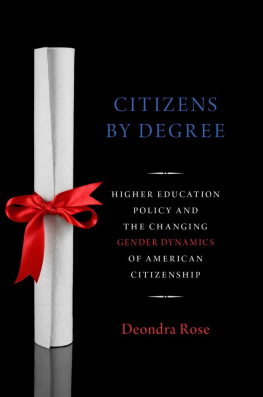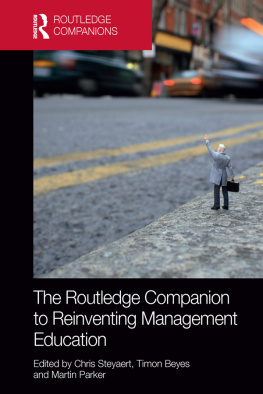
MANAGEMENT AND GENDER IN HIGHER EDUCATION
IRISH SOCIETY
The Irish Society series provides a critical, interdisciplinary and in-depth analysis of Ireland that reveals the processes and forces shaping social, economic, cultural and political life, and their outcomes for communities and social groups. The books seek to understand the evolution of social, economic and spatial relations from a broad range of perspectives, and explore the challenges facing Irish society in the future given present conditions and policy instruments.
SERIES EDITOR
Rob Kitchin
ALREADY PUBLISHED
Public private partnerships in Ireland: Failed experiment
or the way forward for the state? Rory Hearne
Migrations: Ireland in a global world
Edited by Mary Gilmartin and Allen White
The domestic, moral and political economies of post-Celtic tiger Ireland: What rough beast? Kieran Keohane and Carmen Kuhling
Challenging times, challenging administration:
The role of public administration in producing social justice in Ireland Chris McInerney
MANAGEMENT AND GENDER IN HIGHER EDUCATION
Pat OConnor
MANCHESTER UNIVERSITY PRESS
Manchester and New York
distributed in the United States exclusively
by Palgrave Macmillan
Copyright Pat OConnor 2014
The right of Pat OConnor to be identified as the author of this work has been asserted by her in accordance with the Copyright, Designs and Patents Act 1988.
Published by Manchester University Press
Oxford Road, Manchester M13 9NR, UK
and Room 400, 175 Fifth Avenue, New York, NY 10010, USA
www.manchesteruniversitypress.co.uk
Distributed in the United States exclusively by
Palgrave Macmillan, 175 Fifth Avenue, New York,
NY 10010, USA
Distributed in Canada exclusively by
UBC Press, University of British Columbia, 2029 West Mall,
Vancouver, BC, Canada V6T 1Z2
British Library Cataloguing-in-Publication Data
A catalogue record for this book is available from the British Library
Library of Congress Cataloging-in-Publication Data applied for
ISBN 978 07190 8358 7
First published 2014
The publisher has no responsibility for the persistence or accuracy of URLs for any external or third-party internet websites referred to in this book, and does not guarantee that any content on such websites is, or will remain, accurate or appropriate.
Typeset in Minion by
Servis Filmsetting Ltd, Stockport, Cheshire
To Stella with gratitude,
To Emma, Suz, Mags, Claire and Lizzie in admiration,
To Eoin, Conor, Harry, Ciara, Isabel, Leo and Jeff in hope
Contents
Series editors foreword
Over the past twenty years Ireland has undergone enormous social, cultural and economic change. From a poor, peripheral country on the edge of Europe with a conservative culture dominated by tradition and Church, Ireland transformed into a global, cosmopolitan country with a dynamic economy. At the heart of the processes of change was a new kind of political economic model of development that ushered in the so-called Celtic Tiger years, accompanied by renewed optimism in the wake of the ceasefires in Northern Ireland and the peace dividend of the Good Friday Agreement. As Ireland emerged from decades of economic stagnation and the Troubles came to a peaceful end, the island became the focus of attention for countries seeking to emulate its economic and political miracles. Every other country, it seemed, wanted to be the next Tiger, modelled on Irelands successes. And then came the financial collapse of 2008, the bursting of the property bubble, bank bailouts, austerity plans, rising unemployment and a return to emigration. From being the paradigm case of successful economic transformation, Ireland has become an internationally important case study of what happens when an economic model goes disastrously wrong.
The Irish Society series provides a critical, interdisciplinary and in-depth analysis of Ireland that reveals the processes and forces shaping social, economic, cultural and political life, and their outcomes for communities and social groups. The books seek to understand the evolution of social, economic and spatial relations from a broad range of perspectives, and explore the challenges facing Irish society in the future given present conditions and policy instruments. The series examines all aspects of Irish society including, but not limited to: social exclusion, identity, health, welfare, lifecycle, family life and structures, labour and work cultures, spatial and sectoral economy, local and regional development, politics and the political system, government and governance, environment, migration and spatial planning. The series is supported by the Irish Social Sciences Platform (ISSP), an all-island platform of integrated social science research and graduate education focusing on the social, cultural and economic transformations shaping Ireland in the twenty-first century. Funded by the Programme for Research in Third Level Institutions, the ISSP brings together leading social science academics from all of Irelands universities and other third-level institutions.
Given the marked changes in Irelands fortunes over the past two decades it is important that rigorous scholarship is applied to understand the forces at work, how they have affected different people and places in uneven and unequal ways, and what needs to happen to create a fairer and prosperous society. The Irish Society series provides such scholarship.
Rob Kitchin
Acknowledgements
I would like to thank Professor Barbara Bagilhole who invited me to be part of the Women in Higher Education Management (WHEM) Network. Through WHEM I have benefited from many stimulating conversations and productive collaborations particularly with Teresa Carvalho, Kate White, Anita Goransson and Barbara Bagilhole and I am deeply appreciative of this. The University of Limerick facilitated my sabbatical at the Universities of London, Aveiro, Linkoping, Deakin and Melbourne and this enabled me to work in a sustained way with these and other colleagues, and I very much appreciated this.
My interest in gender and higher education dates back to the early 1990s, when equality in the university emerged from Dr Ita Richardsons work as a key concern among Womens Studies faculty and students. Dr Edward Walsh, the founding President of the University of Limerick, prompted me to think about how change in the position of women in universities might be achieved. My interest in management in higher education was heightened by my appointment and re-appointment as Dean of the Faculty of Arts, Humanities and Social Sciences, by three Presidents at the University of Limerick over a ten year period. I am particularly grateful to Professor Roger Downer for his courage in initially appointing me, and to John OConnor and Professor Don Barry who renewed that appointment, and from whom I learned a great deal about power and organisations. Human Resources, particularly the late Dermot Foley, and the current Director of Human Resources, Tommy Foy, kindly facilitated my access to data over the years. Thanks also to Mark Kirwan from the Higher Educational Authority and Lia OSullivan from the Irish Universities Association for access to unpublished data. I would like to thank Professor Tom Lodge and Dr Eoin Devereux for facilitating my reintegration into the Department of Sociology. My thanks to my colleagues in that Department; in Womens Studies; to those at faculty and Executive level in the University of Limerick; in Gender ARC; INTEGER and GENOVATE for their support. I am particularly pleased to be concerned with organisational transformation through the EU funded cross national FESTA project (20122017).






